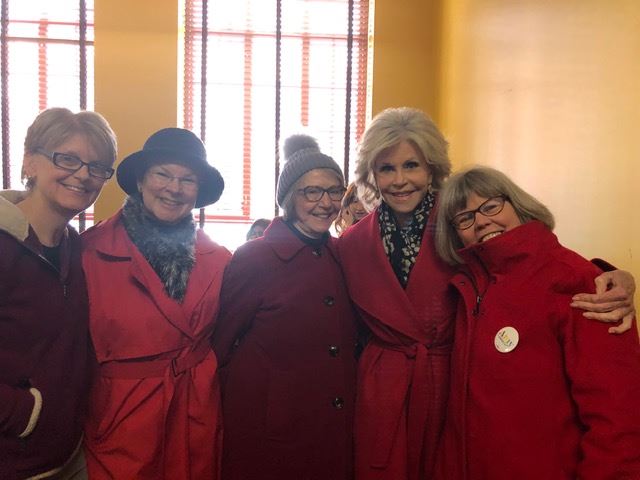Clark County Leaguer Marches for Climate Action with Jane Fonda
By Dee Anne Finken, LWV Clark County
League of Women Voters of Clark County member Lynn Osborn joined actor Jane Fonda and about 800 other protesters in a “Fire Drill Friday” march in Washington, D.C., on December 6. Osborn said she felt her effort helped raise awareness about the threat of climate change.
“I think we brought attention to it,” said Osborn, 69, who traveled to the nation’s capital to participate in one of the weekly fire drills Fonda, 82, began in early October.
The fire drills feature activists wearing red coats protesting on the steps of the Capitol and urging Congress to pass the Green New Deal. Introduced by Representative Alexandria Ocasio-Cortez of New York and Senator Edward J. Markey of Massachusetts, House Resolution 109 is a nonbinding plan that lays out broad actions for tackling climate change. Specifically, it would halt deforestation, mining on indigenous lands and subsidies for industrial agriculture. Fonda said in a Washington Post article in October that she was inspired by 16-year old climate activist Greta Thunberg. Fonda’s takeaway from her: “We have to behave like our houses are on fire.”
Osborn described what it was like to be marching with so many others in the nation’s capital. “I think we brought attention to the tourists who were visiting Washington, D.C., for the people lining up in front of the financial buildings, for the office workers who stopped and watched us,” she said.
Since beginning the fire drills on Oct. 11, Fonda and other protesters have been arrested and then released for their acts of civil disobedience. On the second Friday of protests, actor Sam Waterston, 78, was arrested; actor Ted Danson, 71, was arrested the third Friday.
The fire drills initially drew a dozen or so protestors.
But on December 6, the number of activists had swelled to more than 800. That protest moved to Franklin Park near the capital’s financial district, where organizers had planned to engage in a civil disobedience against financial institutions, explained Samantha Miller, a spokeswoman for the Fonda fire drill events.
“Our civil disobedience action will be shutting down the building of a key corporation financing fossil fuels and deforestation as well as profiting from immigrant detention centers,” Miller wrote in a training manual that Osborn received prior to the event.
“There will be options for people to go inside the building if they are risking arrest or to occupy space outside the building without risking arrest,” Miller noted.
However, Osborn said protesters were not able to enter the financial institution because of extensive law enforcement presence.
“We couldn’t go into the lobby,” Osborn said. “There was a huge police presence all along K Street. There were police in riot gear in front of Chase Bank, Black Rock and Wells Fargo.”
Osborn said the protest at Franklin Park lasted about 90 minutes before the marchers headed down K Street, waving placards and chanting.
Joining Osborn were two other women, including psychologist Kitty Westin, 67, who became friends with Fonda through her efforts to help people deal with eating disorders. Westin introduced Osborn to Fonda.
Also joining the march were actors Kyra Sedgwick and Maura Tierney and several religious leaders. Osborn said organizers emphasized peaceful protest in the manner of the Rev. Martin Luther King Jr. and Mahatma Gandhi.
Osborn, who lives part of the year in Mesa, Arizona, where she is a member of the League of Women Voters of Metropolitan Phoenix, said she will share details of her experience with members there. In Vancouver, she said she plans to continue her work registering voters and with civics education outreach.
A retired school teacher, Osborn has not been widely involved in protests, except for supporting local candidates and working to reduce class sizes in public schools – until now. A warming world has prompted her to change that.
“I think climate change is an existential crisis for our population,” said Osborn, who moved to Clark County three years ago from a Minneapolis suburb, where she was active in League.
“I’m so concerned about the condition of the world my children are going to be facing,” she added.
Osborn is the mother of three daughters and a grandmother of six children – ranging from 10 months to 5 years old.
Read about League positions on global climate change on page 24 of Washington State: Program in Action 2019-2021 and page 63 of the LWVUS Impact on Issues 2018-2020.
Below: Lynn Osborn, second from left, is joined by friends, from far left, Jeanine Cogan, Joann Martin, Jane Fonda, and Kitty Westin, prior marching Friday morning, Dec. 6, in Washington, D.C., to raise awareness about climate change.
